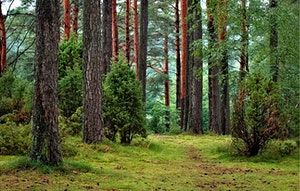Brexit could transform Wales from sheep farms to forest
21 March 2021

The Welsh countryside may see a major increase in forest cover within a decade due to the effect of Brexit on sheep farming, new research suggests.
In a paper published in Land, a team from the University of Reading modelled how the UK leaving the European Union would affect economic conditions for sheep farmers, and the resulting changes in land use.
Looking at five potential scenarios, the researchers concluded that there could be between 35,000 and 313,000 hectares of additional broadleaf forest cover in Wales by 2030 and a proportionally similar boost to conifer forests. The modelled scenario most resembling the current situation is based on the signature of UK Trade and Cooperation Agreement with the EU, and would lead to a 20% increase in broadleaf forest and 18% increase in coniferous forest, equivalent to around 85 million more trees.
The increase would be largely due to the reduction of land being used for sheep grazing, as well as increased activity in commercial forestry due to a proposed adoption of a form of Environmental Land Management payment scheme in place of the EU-wide Common Agricultural Policy (CAP).
Professor Martin Lukac from the University of Reading’s School of Agriculture, Policy & Development said: “The impact of Brexit will be felt for years to come, shifting economic forces and changes to policy around agriculture will inevitably change the way we use land in the UK.
“With this study, we have analysed past trends of land use change and made some conservative assumptions about the effect of trade conditions and proposed Environmental Land Management schemes.
“What is clear is that the Welsh countryside will change over the next ten years due to Brexit, and that will have both positive and negative effects for different actors. On the one side, our most conservative models suggest that we could see around 85 million more trees in Wales through a combination of planted coniferous forest and natural regeneration of broadleaf woodlands. The benefits that this will have for our natural environment would be significant for carbon sequestering and for biodiversity of woodland habitats.
“However, the net gain of millions of trees will be at the cost to the Welsh sheep farming industry, which could suffer due to additional export friction with the EU and increasing competition from other export markets such as Australia and New Zealand as the UK pursues free trade.
“Of course, these are just models. Political decisions will make significant differences to how the Welsh countryside will look in 2030, but it’s safe to say that whatever does happen, the landscape and the rural economy of Wales will change.”
Five possible scenarios following Brexit were considered, and in each scenario, the research team considered how new regulations would affect grants and subsidies available as well as the trade environment for Welsh farmers.
The study was conducted prior to the UK reaching a free trade agreement with the EU and modelled the possible outcomes if the UK reverted to other trading rules.
Following a ‘Business as Usual’ model in which Basic Payment Scheme subsidies from the EU’s CAP support are replaced like-for-like, there would still likely be a 20% increase in forest cover in Wales, equating to 200 extra hectares of trees. This is a reflection of changes observed in the recent past.
At the other end of the scale, the team modelled the possibility of an extreme free trade approach, which would lead to a significant impact on domestic beef and sheep prices making many farms financially unviable. In this extreme case, the effect on land use would be dramatic with a potential increase in coniferous and broadleaf forests of around 200,000 ha and 313,000 ha respectively, resulting in more than half a billion more trees.
First named author Dr Syed Amir Manzoor from the Department of Forestry & Range Management, Bahauddin Zakariya University Multan in Pakistan conducted the research while based at the University of Reading. Dr Manzoor said:
“Our modelling really shows the pronounced impact that the EU has already had in supporting certain economic conditions for land use. It should be remembered that the iconic pastoral, sheep-grazed hillsides of Wales only look like that because taxpayers have been paying for sheep to graze. Overall, Welsh sheep farmers received between 45-80% of their turnover from EU subsidies prior to the UK leaving the EU.
“As a result, changes to the conditions for farmers to receive subsidies and grants, such as Wales’ proposed Sustainable Farming Scheme, are going to provide incentives to farmers to be more mindful of the environment.
“It is clearly a good thing to try and mitigate against man-made climate change and natural defence such as forests will help. But there could be wider economic and cultural costs to pay for such widespread landscape changes, not least in the livelihoods and traditional ways of life for Welsh farming communities.”
Full citation:
Manzoor, S.A.; Griffiths, G.; Christian Rose, D.; Lukac, M. The Return of Wooded Landscapes in Wales: An Exploration of Possible Post-Brexit Futures. Land 2021, 10(1), 59; DOI: 10.3390/land10010059

